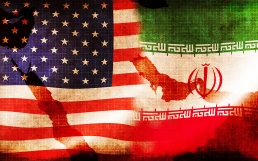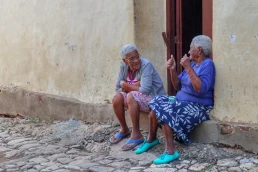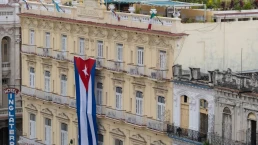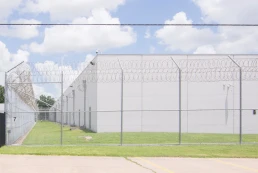Many people are already investing themselves in the local peace economy as they divest from the economy of war.
By April M. Short, Independent Media Institute
War is not innate to humanity; it is learned culturally, and intentional systems of peace can prevent it from happening, according to anthropological research. We are living at a critical time in the history of humanity in which preventing and divesting from war are essential to our future existence—especially given the realities of the global climate crisis and the fact that the U.S. military is the worst single polluter that exists (and not even mentioning the unspeakable potential for destruction that nuclear weapons pose). If war is cultural, then we can prevent it by intentionally moving ourselves into a culture of peace. How do we do this? We begin with ourselves. We begin to break our war economy habits, and actively divest ourselves, wherever possible, from the ways in which the war economy takes hold in our lives. And we purposefully invest ourselves at the local level in what is often called the peace economy—the caring, sharing, supportive economies that already exist all around us.
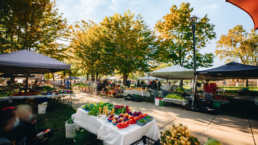
The economy of war thrives on extraction and materialism, so it has—for thousands of years, and by no accident—made trite (or violently stifled) the things that are most valuable and important about living: caring; nurturing; love; art; peace; expression; and connection with nature, our bodies, and each other. The war economy, which is the overarching economic system of our times, promotes a culture that actively devalues play and community, and overly values hard work and individualism—to the grave detriment of mental and physical health. It uplifts money hoarding, competition, and the flaunting of one’s material wealth over generosity, sharing, collaboration, and appreciation. It stifles grief and asks us to harden ourselves against the expression of feeling rather than inviting us into depths of emotion where we can realize the gift of being alive in this world, together, for just a brief time.
The results of this unsustainable and unnatural lifestyle are ugly: Clear-cut, monocropped tree farms where once thrived biodiverse FernGully-esque old grove forests in the Pacific Northwest, the Amazon, and around the world; endless mining and building projects that plunder habitats, natural wonders, and Indigenous communities; worsening mental health afflictions, an opioid addiction epidemic, and soaring suicide rates; toxic chemicals and microplastics in our soils, oceans, streams, and bloodstreams that are causing irreparable damage to the planet and our bodies; people treated like criminals for experiencing homelessness, even amidst a devastating cost of living crisis; racist, militarized police murdering people in broad daylight, and often walking free even when they’re caught on camera; hustle and greed culture and the agony that comes with living a daily grind; so much unnecessary loneliness and stress… and this list could go on and on.
But a movement is building from the commons to break with these war economy ways and replenish ways of being that are actually livable. Around the world, there are projects, people, and organizations creating solutions to the problems of our times. They are actively helping in divesting from the war economy in powerful ways. These examples of the local peace economy in action demonstrate that it is possible to create systems in which wealth and worth are rooted in equitable, community-centered care practices like health care for all, farming and feeding each other, parenting and education that are entrenched in love and engagement, and a culture that uplifts us and inspires interconnection.
The peace economy is built brick by brick, through the commitments of individual people and communities. What follows are some examples (of many more that exist worldwide) showing how people and communities are divesting from the war economy and investing in a future centered in peace, love, and aliveness:
Our globalized, Big Ag, monoculture food systems—which are monopolized by a handful of megacorporations owned by billionaires responsible for the war economy—are unraveling. The COVID-19 pandemic cast a bright light on the fragility of those systems. But the issues the pandemic exposed were present prior to 2020, and they promise to continue into the future. People in communities around the world are relocalizing food supply chains to create food sovereignty and reclaim culture in these times of fraying global food systems:
- Communities in the Pacific Northwest have been working to regionalize food supply chains through relocalized flour mills, sustainable livestock ranches, a creative chicken farming model, and community garden programs. These efforts have paid off in creating food security for communities while also leading to greater job opportunities and a thriving ecosystem.
- Palestinian farmers have been rekindling connections with Indigenous farming practices and creating community-supported agriculture (CSA) programs to resist Israeli colonialism. This has helped Palestinians to reconnect with their land and economically support locally grown food.
- Black, formerly incarcerated people in Chicago are challenging the megacorporations that tend to dominate food contracting with schools and other large facilities in America by prepping locally sourced meals for schools, nursing homes, and transitional housing. The Chicago worker cooperative ChiFresh Kitchen is 100 percent employee-owned and provides nutritious and culturally appropriate food to these institutions and facilities.
- There are many networks of Indigenous seed savers and others keeping and propagating seeds in community gardens and cooperative programs in the U.S. and around the world. Indigenous-led communities like Seeding Sovereignty and many others are keeping their spiritual connections and cultural practices alive through their connections with seeds, and seed savers are challenging the monocrop-based Big Ag industry that is responsible for so much deforestation and other climate destruction. These networks have also helped bring back “Indigenous foodways that were lost during genocide and forced relocation” inflicted by European colonizers.
- The Deep Medicine Circle in the San Francisco Bay Area, a women of color-led, worker-directed 501(c)(3) nonprofit, is one group that is rethinking health care at its roots, and healing the ways U.S. colonial extraction is making people sick. Local community members who make up Deep Medicine Circle are creating systems of health and care, through the lens of community food justice. They’re planting community gardens and thinking up long-term models of localized food and community engagement that uplift Indigenous practices, provide access to healthy foods in poor urban neighborhoods, and dismantle colonialist ways of thinking and being in the world.
- Neighbors are voluntarily keeping free-food fridges stocked in cities around the world, in a mutual aid movement that gained speed in response to the economic impacts of the COVID-19 pandemic. People have fed and cared for each other through the pandemic and beyond, creating a free-fridge movement that has raised awareness about racial inequity in food systems.
- Sallie Calhoun’s Paicines Ranch in California is working to bring agricultural business and investment up to date with our times and closer to nature by prioritizing ecosystem health, habitat, and the sequestration of carbon through soil practices. The project was founded with the aim of working with the dynamic natural world to explore ways of building healthy ecosystems while growing crops and supporting community through food. Paicines Ranch is intentionally creating a model of doing business that is focused on managing complexities rather than solving problems, and is centered on adding true value over profits.
Outside of the food system, examples of other applications of mutual aid, social justice, creative arts, community resilience, and activism for human rights and the environment that all embrace the peace economy include:
- People are reimagining safety through alternatives to policing. Safety in the peace economy comes from the engagement of community and the reallocation of resources and funding into programs of care—not militarized police forces and punitive systems of justice. While many alternatives to policing already exist, recent initiatives after the murder of George Floyd by police in May 2020 have introduced changes, both big and small, across the U.S., and the global uprisings against systemic racism have led to these issues being part of the mainstream conversation.
- Creative cooperatives are reclaiming real estate and bringing access to art, living spaces, and community spaces back to marginalized Black, Indigenous, and people of color (BIPOC) in Oakland and elsewhere who have played an integral part in shaping the culture of cities across the U.S.
- Fire recovery efforts in Oregon, California, and elsewhere have depended on people-led mutual aid projects and local volunteer networks. Devastating fires, worsened by climate change and the criminal negligence of public utilities like Pacific Gas and Electric (PG&E), have been increasing in recent years, some of them incinerating entire towns. Fire recovery efforts in Oregon and California have largely been community-led, and networks have formed among neighbors to create resilience and support—including grief spaces like those created in Ashland, Oregon, which provide a space for people to share their experiences of loss.
- People are fighting the fossil fuel industry while building community spaces and support for people who are homeless in New Mexico. The grassroots project is part of a larger project in New Mexico. SOL for All has brought solar power to various locations across the state in an effort to support alternative energy solutions, which are necessary to combat climate change.
- The largest dam removal in history started in 2023 in southern Oregon and Northern California, thanks to years of Indigenous-led community activism. The Karuk, Yurok, and other Native American groups for whom the Klamath River Basin is their ancestral home since time immemorial have been organizing against the dams since they were proposed in the 1910s—which have had disastrous results for people, salmon, and other wildlife—for decades. After multigenerational efforts, the massive dam removal project is expected to be completed by 2024.
- Many people are also building a peace economy through creative sharing efforts and alternatives to money-based exchanges. This includes community gardens, mutual aid groups, and participation in the solidarity economy, and just transition efforts like those of Americans with jobs sharing their stimulus checks with those in need in the early days of the COVID-19 pandemic. People are also creating skill share networks like Kola Nut Collaborative and others, and millions of people daily are sharing tools and operating in a moneyless economy via “free” signs on street corners, Craigslist’s “free stuff” page, Freecycle, and other creative routes.
The above are just some of the countless examples of the peace economy in action—and most of these efforts were started by just one or two people deciding to do something about the problems they saw happening in their local community.
This article was produced by Local Peace Economy, a project of the Independent Media Institute.
Recent Posts
The Iranian Trap: Neither Military Action Nor Nuclear Negotiations Can Solve Trump’s (and Israel’s) Conundrum
February 16, 2026
Take Action Now After a failed regime-change strategy and an increasingly risky military buildup, the Trump administration turns back to nuclear…
Suffocating an Island: What the U.S. Blockade Is Doing to Cuba
February 16, 2026
Take Action Now Electric motorcycles are Cuba’s response to the fuel crisis.By Medea Benjamin Marta Jiménez, a hairdresser in Cuba’s eastern city…
For Trump and Rubio, Colonizing Cuba Is Not About Freedom—It’s About Their Own Egos
February 15, 2026
Take Action Now For Trump, regime change in Cuba will cement his legacy. For Rubio, it will mark the culmination of his childhood dream. In their…
Trump’s Concentration Camp Build-Out Includes Nearly $40 Billion for Warehouse Conversions
February 14, 2026
Take Action Now “Germany’s concentration camps didn’t start as instruments of mass murder, and neither have ours,” wrote talk show host Thom…

